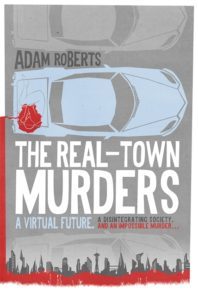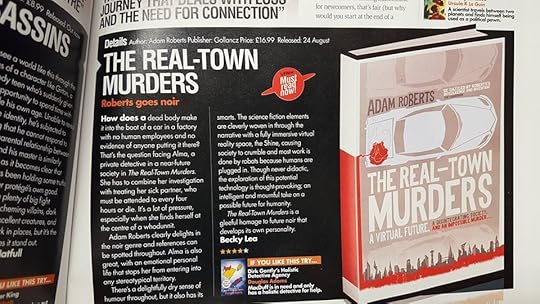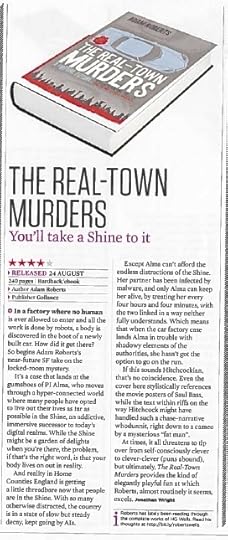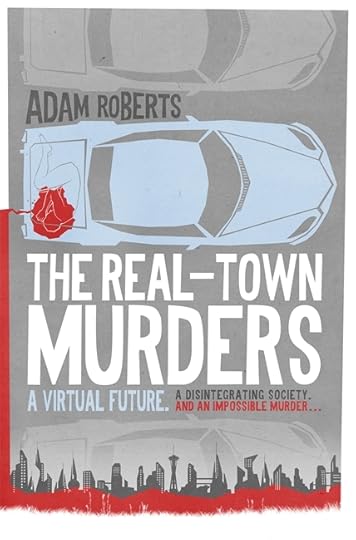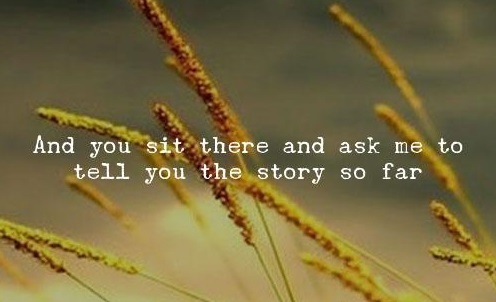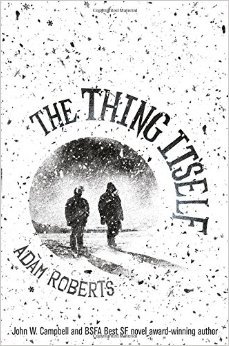Adam Roberts's Blog, page 7
September 20, 2017
Maxim Jakubowski on “Real-Town Murders”
This is a first for me, I think: one of my novels reviewed by the eminent crime-fiction reviewer Maxim Jakubowski at a crime fiction site Crime Time. Here's what he thinks:
Adam Roberts/THE REAL-TOWN MURDERS (Gollancz) Roberts is one of the prominent SF author of ideas (alongside another Brit, Ian Watson) and this locked room impossible mystery set in the almost future in which a body is found in the boot of a car inside a fully-automated factory where every inch is constantly under the scrutiny of CCTV, is a wonderful example of his craft and intelligence in full deployment. Alma is a private detective assigned to the case in a near future world where most of the population are in the grip of an addiction to the Shine, a web-based alternate reality in which people prefer to live, seeing that most jobs are now superfluous as computers and machines take on all of the burden. Alma has an ill partner at home in need of regular gene therapy which only Alma can provide, which badly limits her time and the distance she can put between herself, her erstwhile lover Marguerite and the actual case, which makes the fast-paced action an ersatz Hitchcockian race against time, which leaves one a tad breathless. A wonderful variation on one of my favourite crime fiction sub-genres. Gripping and ingenious.
August 29, 2017
Burgess and the Black Prince
In today's Independent, a good article on Burgess and my unfinished Black Prince project. Please pledge, if you can!
August 26, 2017
Alan Jacobs on “Real-Town”
As he notes in this detailed, generous and (of course you'd expect me to say so) perceptive essay on Real-Town Murders, Alan is a friend of mine. You may, accordingly, want to take his praise with a pinch of salt. Value judgement aside, it seems to me that he's basically right about my perversity, and I am certainly fascinated by a particular—I would say—sweet spot where pulp's kinetic verve meets the sorts of halting disintegration of language that characterise actual human discourse, that latter taste at least as old as my PhD work on Robert Browning, a poet of whom Lionel Trilling rightly said 'he was interested less in speech and more in the obstacles to speech'. But I can neither complain nor act surprised when I discover that other people don't feel the same way. Besides which, the Author Is Dead, and I'm an author, so my opinion shouldn't sway you. That said, I'm still alive enough to be genuinely grateful for Alan's kindness and frankly a little abashed by his high opinion.
SciFi Now Reviews “Real-Town”
Must read now, it seems. Bear with me: there will be a couple of these over the coming weeks. Normal service will resume after that.
August 21, 2017
Real-Town Murders: SFX review
My new novel, The Real-Town Murders, is officially published this coming Thursday (24th August), but already there are some reviews of it in the world. Above is what Jonathan Wright, of UK genre's premier magazine SFX, thinks of it. It's a pretty positive review, although as you can see I am docked a star for being too clever-clever (ah, how that phrase has dogged my career! Ah well.)
June 10, 2017
Anthony Burgess and Adam Roberts, “The Black Prince”
I have a favour to ask.
So: Unbound are hoping to publish my collaboration with Anthony Burgess, The Black Prince. If you visit the Unbound page you'll discover more about the project: in a nutshell, I took Burgess's idea from the 1970s to write a historical novel about the Hundred Years War in the style of John Dos Passos (one of many projects the ridiculously prolific Burgess never finished), his basic structure and an unmade screenplay he wrote, and completed the novel. Just the idea that there might exist in the world, some day, a book with Burgess's name and mine on the cover fills me with an excitement it's hard to convey: so dedicated a Burgess fan-boy I am. In order to prepare for writing this project I re-read the entire run of Burgess's fiction, which only cemented for me my sense of how extraordinary and important a writer he was. I hope I have done his genius justice in finishing his idea: part of me thinks I have. At any rate it's unlike any other historical novel of which I'm aware.
For this to become a reality, though, I need anyone interested to pledge to support the project. You can do that at the Unbounders page, and if enough people do then the whole book becomes a reality. For each pledge you get a copy of the book with your name in it, additional material (depending on which pledge you opt for) and my genuine and unceasing gratitude.
May 19, 2017
Real Town Murders
Cover reveal: book comes out 24th August. It's part locked-room puzzle-whodunit, part SF/Hitchockian thriller, and part literary-pretentious meditation on location, gender and textuality. So, that's three parts; but you get all three for one low, low price!
May 18, 2017
2017: the Story of Far
Another quick retrospective.
So: in 2016 I published the short novel Bethany (if you're curious, here's what Interzone thought of it), various short stories in various venues, blogs and reviews and whatnot. I also, in what was, for me, last year's biggest SF-related publishing event, put out the second edition of my Palgrave History of Science Fiction. We're now at the stage in 2017 when all the genre's awards have been announced, and the various other signs of esteem made manifest, which means that the predictions I made in this post, from a year ago, have been borne out. I do indeed appear to have transitioned from being a writer whose work was shortlisted for, but didn't tend to win, awards, to a writer whose work is not even shortlisted. All of this year's awards and markers of community esteem have come and gone, and my name hasn't troubled any of them.
This'll be the case in 2018 too, I think. Real Town Murders is coming out in late August, and is a straightforward SF puzzle whodunit. I hope it sells some copies, that people like it, are puzzled by its puzzles and entertained by its Hitchcockian adventuring, but that's as far as my ambition for this title goes. Beyond that the only other project of mine happening in 2017 that might, even conceivably, interest the genre community is my ongoing H G Wells blog, and very obviously that's not going to appear on any 2018 award shortlists. To summarise what I said in my previous, 2016-in-retrospect post, there comes a time, if you stick at the business long enough, when, as it might be, 'I have never been so much as longlisted for a Hugo/Nebula' pivots into 'I will never be so much as longlisted for a Hugo/Nebula', and when that moment comes you have to find a way of handling it—I mean on a personal level. Resentment is neither merited nor healthy, giving-up is too feeble and pretending that things are better than they actually are is merely fooling yourself. But it is, I discover, possible to settle more-or-less comfortably into one's failure. Turns out: it's not so bad.
Reflecting back on last year's 'Story So Far' post, and comparing my state of mind this year, I can record that I am markedly less upset today than I was a year ago. So that's good. Indeed, re-reading that old post is a rather uncomfortable experience for me today: I was, when I wrote it, evidently still in the process of trying to talk myself into a state of acceptance of my failure. Now, a year on, that acceptance is rather more intuitive and actual. It's a process, I suppose, as many things are.
If regret still nibbles, mouselike, somewhere in the barn of my brain it probably has to do with my Palgrave history of SF. The first edition of that work was perfectly overlooked by awards, as also by other academics, the broader debates about the nature of the genre and so on. It had some problems, that first edition; and I worked hard at addressing those for the second edition, as well as expanding the book considerably, with whole new chapters. The complete lack of recognition for or engagement with this book in genre likely only indexes its many inadequacies, but it does sadden me a little, because the argument I make in this book still seems to me both original and, well, true: that SF begins not with Gernsback, Wells, Verne or even Shelley, but with the Protestant Reformation, when 'science' as we understand it today starts to coalesce and a new 'science' fiction buds off from the broader traditions of Fantasy (Fantasy being the default mode of storytelling throughout human history, from which things like 'mimetic fiction' and 'the realist novel' are relatively short-lived aberrations).
Some people may think this thesis wrong. Others, conceivably, may simply shrug a 'so what?' But I do think there's more to my argument than just trudging through a ton of SF texts published in the 17th through to the early 19th centuries that nobody reads any more, and that only scholars could find remotely interesting. Which is to say, I think that the DNA, as it were, of modern SF contains elements from the Protestant Reformation, and properly understanding contemporary SF means understanding that. I'm not saying that SF is in any affiliative or doctrinal sense protestant: clearly great SF is being produced all around the world by writers of many different religious beliefs and by writers of none. But I do argue that SF is still marked by its origins, and those origins were Protestant. A parallel I explore in my book is Capitalism, an economic philosophy that has come to dominate most of the globe, and which has its roots in the specifically Protestant work ethic and mercantile exchanges of 16th- and (especially) 17th-century northern Europe. We would not today insist that living a life shaped by Capitalism, or holding a fundamentally Capitalist ethos, disqualifies one from being Catholic, Muslim, Hindu or Jewish. Nonetheless, the (to use the inadequate metaphor once again) DNA of Capitalism contains much that is Protestant. So with SF. We could say that the connections between the often commodity driven, trader-and-colonist, individualist imagined worlds of much 20th- and 21st-century SF owes as much to the determinations of Capitalism as it does to Protestantism. I would argue that these two latter things cannot be neatly separated out from one another. I go on to quote Gary Westfahl:
‘Although science fiction was created in the marketplace,’ says Gary Westfahl, ‘and always seemed comfortable in that milieu, its leading figures, paradoxically, constantly struggled against the natural pressures that the market exerts upon its products.’ [Westfahl, 81] Some might object to the characterisation of market forces as ‘natural’, and distance themselves from the tacit characterisation of such people as fools for opposing market Capitalism. Not Westfahl, who thinks that ‘after several decades’ of resistance, such individuals ‘finally lost that battle’. We should, he insists, ‘celebrate this triumph of the marketplace’. We may not wish to do this, but we will find it hard to deny the bald fact to which Westfahl refers. SF is a marketplace product, not only by contemporary happenstance of sales, but because precisely this capitalist logic is part of the cultural revolution that created SF in the first place.
At any rate, if the argument of the Palgrave History has failed to convinced my fellow scholars, at least I have made my case, and at exhaustive length, so I can stop worrying about that now and move on to other things. Onward!
May 10, 2017
New Short Fiction for May
April 29, 2017
Some Recent Reactions to “The Thing Itself”
Reactions to The Thing Itself continue to bubble under. On Twitter Gwilym Eades called it ‘one of the best novels of any genre’ and ‘[the] Kind of book u finish reading & u want to read everything else by the author’, and added a link to his blogpost discussing the novel; and Philip Christman has reviewed the novel very generously for the Christian Courier, saying it ‘provides all the thrills of an airport-bookstore read, and a universe besides’. Particularly gratifying for me is that he also says the book ‘provokes some important questions’, in particular: ‘is the God of Kant also the God of Abraham, Ruth and Jesus? Karl Barth for one would say no’.
Also, and though it's not specifically related to TTI, I'm a huge-enough XTC fan to have been ridiculously chuffed by this tweet from Jonathan Thornton.
I submit that @arrroberts is the @xtcfans of SF: wrongly labelled too clever by half; in a sane world would be appreciated by everyone
— Jonathan Thornton (@JonathanThornt2) March 31, 2017
Adam Roberts's Blog
- Adam Roberts's profile
- 558 followers


